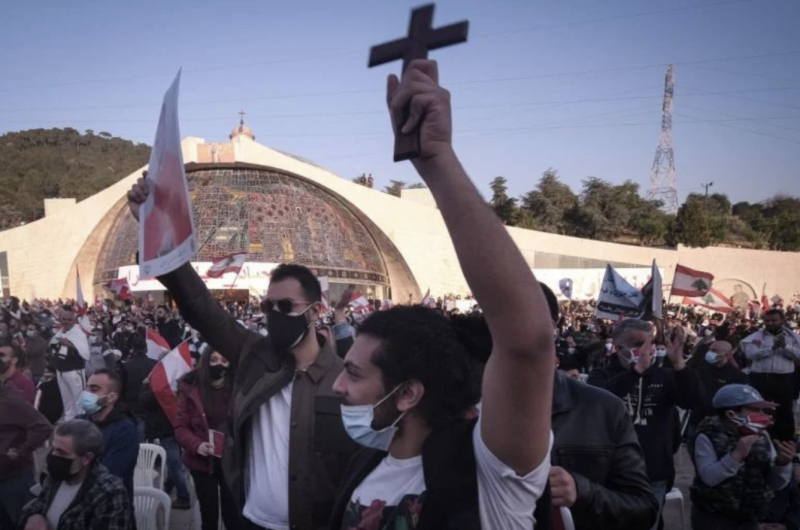
A young man brandishing a cross at a rally in Bkirki, headquarters of the Maronite Patriarchate, in February 2021. (Credit: João Sousa)
There is a five-week difference. For Catholics, Jesus Christ rose on March 31; for Orthodox, He will on May 5. This five-week gap between the two Easters had yet to happen since 2016.
While two weeks sometimes separate the two dates, there is a four-week difference at others, and Easter is often celebrated on the same date.
But where does this gap come from? Maronite Father Tanios Khalil and Orthodox Father Ibrahim Saad provided an answer to L’Orient-Le Jour.
One moon, more or less...
It may seem odd, but the difference between the two Easter dates is based on a calculation that considers the lunar calendar. Traditionally, Easter must be observed on the first Sunday following the first full moon after the spring equinox. This equinox usually falls on March 20 or 21.
This year, for instance, the first full moon after the equinox fell on March 25. Thus, Catholic Easter was logically celebrated on the following Sunday, March 31.
“Yet, we base ourselves on the Gregorian calendar, whereas the Orthodox adopt the Julian calendar for certain feasts.” Father Tanios Khalil, dean of the Faculty of Religious Sciences and Theology at La Sagesse University, shed light on this interesting point. The Orthodox Church follows the Julian calendar, a solar calendar of 355 days introduced by Julius Caesar. Using this calendar, this article is published on March 19, not April 1, 2024. All the time difference is due to this simple difference in reference.
Back to the fourth century
To better understand this, one needs to go back to 325, the year in which the first Ecumenical council, was held in Nicaea and convened by Emperor Constantine. It was intended to unify the Eastern Churches and find points of agreement between the different rites. Convergences were found, but each community insisted on its calendar.
“The first thing that the council decided was not to align our celebration with the Jewish Passover,” said Father Khalil. “The Jews follow the lunar calendar for their Passover. The idea is not to celebrate it simultaneously,” he added.
This principle is also applied by the Orthodox, with one key nuance: The celebration must always fall after the Jewish Passover, never before it. “In the Gospel, Christ is crucified at Passover and resurrected three days later. So it makes sense,” said Father Khalil.
The second rule that the Council established 1700 years ago is for all Christians not to celebrate Easter before March 22. That’s where the problem lies for Orthodox Christians this year: March 31, the date on which Catholic Easter falls, is March 18 in the Julian calendar. That means it falls before March 22. Hence, the Orthodox cannot celebrate Easter on that date, unless they break the rule decided at Nicaea (now Iznik, in Turkey).
Father Ibrahim Saad, representative of the Greek Orthodox Metropolitan of Saida, Elias Kfoury, explained that “in this case, we move it for one month, using the following full moon as a basis.”
For 2024, Orthodox Easter is supposed to be set on April 28. So why is it on May 5 instead? Father Saad explained “We moved it because the Jewish Passover is celebrated until April 30,” recalling the first rule set by the Council.
Towards unification?
In addition to the complex calculations, this kind of topic can also highlight political differences and rekindle sectarian quarrels in Lebanon. The controversy over switching to daylight saving time last year is an example.
“I’d be in favor of unifying the dates. We do it well for Christmas,” said Father Saad. He recalled that the Greek Orthodox Church of Antioch — unlike the Russians — observes Christmas on the unified date of Dec. 25, rather than celebrating the Nativity of Christ on Jan. 7.
Father Khalil has the same opinion. “Several popes have called for Easter to be unified, and more and more people are in favor of that,” he said. To make such a change, many more ecumenical councils will be needed.
This article was originally published in L'Orient-Le Jour. Translated by Joelle El Khoury.